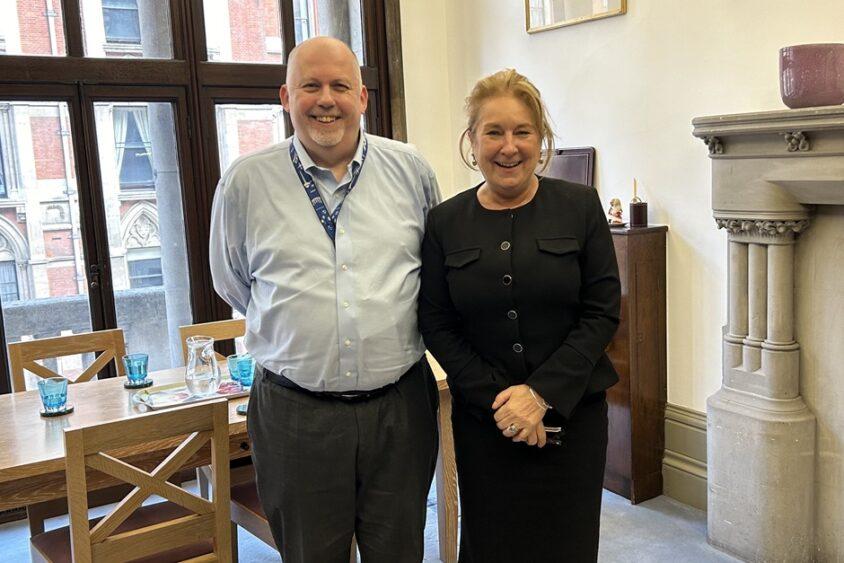Every day, the Magistrates’ Association (MA) advocates on behalf of our members. Our national officers, together with our five policy committees and supported by our small staff team, cover a wide range of issues that matter most to our members and represent the organisation on external bodies. Since our last advocacy update in August, we have prioritised the following nine issues.
1. Supporting family magistrates
Family magistrates continue to face practical difficulties in fulfilling their roles. Our family court committee has heard from members about the patchy provision of devices like iPads and laptops for conducting hearings. We have also reported to the Family Magistrates Oversight Group the poor quality, inaccessibility, and lack of technical support for devices used by family magistrates to read bundles and conduct hearings. We are pleased that our concerns have been heard and we have secured a commitment from His Majesty’s Courts & Tribunals Service (HMCTS) to conduct a full review of the provision of devices for family magistrates. The chair of our family court committee, Tracy Sortwell, looks forward to progress reports on this review in the coming months.
2. Qualified legal representatives
In September, we wrote to the President of the Family Division, Sir Andrew McFarlane, and the Minister for Courts, Mike Freer MP, calling for urgent efforts to secure more qualified legal representatives. Since the introduction of the scheme under the Domestic Abuse Act 2021, our members have seen a drop-off in the availability of advocates willing to take on this type of work. Reports from our family magistrate members indicate that the poor levels of remuneration are a principal cause of this. Given that a high proportion of family cases have a domestic abuse element, we have urged the government to look again at this scheme to ensure that victims of domestic abuse are heard and are not disadvantaged where they cannot afford representation. The president has assured us that he is working with the minister to improve the scheme.
3. Open justice
In the same month, we responded to the Ministry of Justice’s (MOJ) consultation on open justice. We have urged the government to make open justice a guiding principle in all decisions about reform and improvement, to plug the gaps in publicly available data, and to invest in strengthening the public’s understanding of what happens in courts. This includes investment in programmes like the MA’s Magistrates in the Community.
4. Alienating behaviours
The following month, we responded to new draft guidance for the family court on dealing with allegations of alienating behaviours in private law cases. These cases that garner an increasing amount of media attention must be addressed with care. The President of the Family Division has reminded the judiciary in case law that the language we use around allegations is important. Our response noted that magistrates must be empowered to retain cases where the allegation in question is not capable of meeting the three elements of alienating behaviours. We highlighted the importance of the gatekeeping decision and stressed that we must not overburden district and circuit court judges where a case can be managed effectively by magistrates.
5. Accessibility
Our report on the accessibility of magistrates’ courts was widely covered in the media in the summer, but our work on improving access hasn’t stopped there. Since its publication, we have responded to the proposed Blackpool Courthouse scheme and the Government’s proposed Disability Action Plan to reiterate our messages, secured additional funding for court maintenance and supported several members to pursue accessibility improvement locally. We have heard continued reports that a significant proportion of lifts in magistrates’ court buildings are out of order. We want to hear more about this, so if you are impacted by broken lifts or are struggling to make your minimum sittings due to accessibility problems, please email us at policy@magistrates-association.org.uk.
6. Prison capacity
In October, we published a media statement setting out our position on measures announced by the Lord Chancellor to deal with the capacity problems in prisons. Our statement supported measures to reduce the use of short-term sentences but said that the success of these measures highly depends on the availability of suitable community sentence alternatives and the proper resourcing of the probation service. We will continue monitoring the impacts of these changes and are meeting with the Minister for Courts, Mike Freer MP, to discuss this issue further.
7. Relationship building
In the same month, our National Chair, Mark Beattie JP, and our Chief Executive, Tom Franklin, met the newly appointed Lady Chief Justice. The Lady Chief Justice already understands the magistracy well, having previously chaired the Judicial College committee charged with responsibility for magistrates’ training for four years, but we were able to brief her on the current issues that matter most to our members. We are delighted that she will be speaking at the MA’s annual conference at the end of this month.
8. Single Justice Procedure
In the past few months, we have been active on the issue of the Single Justice Procedure process. We have published a media statement explaining the role of magistrates in the process, and another statement on the announcement of the rollout of the 3:1 operating model.
9. New magistrates’ survey
We recently surveyed new magistrates to understand their recruitment experiences. Findings revealed the need for clearer and more consistent communication during the application process, particularly regarding the level of commitment, especially in the first year. We are using these findings in our discussions with both HMCTS and MOJ. With the latter, we have already met with officials and emphasised the importance of keeping applicants informed of their progress at every stage of the application process. If you are a new magistrate, please email us your comments or insights at policy@magistrates-association.org.uk


